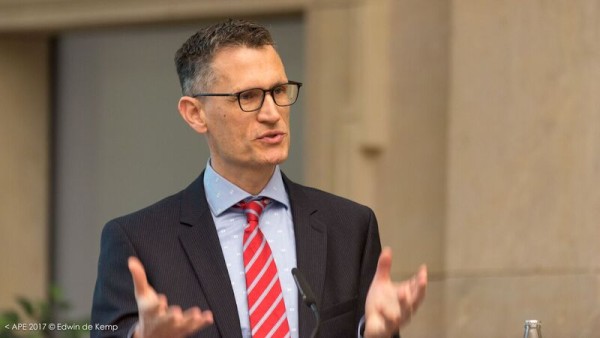
IPA President Michiel Kolman.
Last Fall, Michiel Kolman was elected to succeed Bloomsbury’s Richard Charkin as president of the International Publishers Association (IPA)—and he certainly takes over at a tumultuous time. A global copyright debate is heating up, for example, and freedom to publish is under threat in many nations—including in Turkey, where the Erdogan regime has cracked down on authors, scholars, and journalists following a failed coup in 2016. PW caught up with Kolman, Senior Vice President of Global Academic Relations at Elsevier (and a Columbia-educated astrophysicist) ahead of the 2017 London Book Fair to talk about his upcoming term as IPA president.
In accepting your two-year term last fall, you noted that publishers are facing "challenging and rapidly changing times," and you especially cited copyright issues. How do you and the IPA see the copyright debate at the moment?
I am glad you raised copyright first, as it is a primary pillar of the IPA. We foresee the conversation continuing about how to modernize copyright and to adapt it to various exceptions and limitations. In principle, exceptions are workable. But if they are overbroad, and if there are exceptions in too many areas, then the foundation of publishing is undermined and publishers will no longer be able to invest and innovate. An example where exceptions have been too far-reaching and damaging is in Canada, where the educational publishing industry has taken a heavy hit. At the moment, the IPA is very active and engaged at WIPO, where there are ongoing discussions on copyright exceptions and limitations for education, libraries and archives, and disabled persons.
Politically, the world seems awfully, well, unstable. Is this influencing IPA's work?
We do live in a world that seems more politically unstable than before, and for this reason the IPA’s work around Freedom to Publish is more important than ever. This includes making interventions when individual publishers are under threat, for example, in Turkey, where at the moment we are fully behind the work of our German member, the Börsenverein. We have also ramped up our efforts to promote Freedom to Publish through the IPA’s Prix Voltaire, a unique annual award that honours the bravery of publishers who stand up for Freedom to Publish, often at great personal. In times of instability, people look increasingly to reliable and trustworthy high-quality information—if they are not looking to publishers, then who?
Last year there was some controversy over China and Saudi Arabia's membership in IPA—which your predecessor Richard Charkin addressed at last year's Frankfurt Book Fair. Any updates there?
We are a global organization, and we will always carefully consider an opportunity to speak on behalf of more publishers around the world. But as I said in my acceptance speech in Frankfurt last year, membership in the IPA also comes with responsibilities, too. And that means that IPA members must actively support the key pillars of our organization, including the freedom to publish, and copyright protection. We are very actively engaged with all new members—most recently, applications from the national publishers associations of Iraq, Ivory Coast, Mauritania, Morocco and Senegal were accepted via elections in 2016. And I will visit China next month, where I’ll continue our engagement with the Publishers Association of China.
With your tenure as IPA president now well underway, what other key issues are on your radar?
Copyright is and will remain a focal point for the IPA, as will Freedom to Publish. We have a very active and motivated chair of the IPA Freedom to Publish committee in Kristenn Einarsson, from Norway, who has begun exploring some exciting new ways we can enhance our advocacy in this area. We will strongly advocate for publishers around the world whose work is under threat—whether in Turkey, China, or any other country. A recent example is the Mauritanian blogger Mohamed Ould Cheikh Ould Mkhaitir, whose execution for apostasy is sought by clerics over a blog post written in December 2013. And, as I said, in the era of fake news and increasing political turmoil, the publishers role in providing reliable information more important than ever.
Longer-term, we’re seeing significant social change across the globe, and the rate of that change is increasing. The level of interconnection, the impact of artificial intelligence, quantum computing, will all have dramatic impacts on our societies and our lives. Education is crucial to keep up with this evolution, and to prepare the next generations for whatever lies ahead. And it is publishers in general, and educational publishers in particular, that will provide the information and services needed to support people as they seek to adapt to these societal changes.
source: www.publishersweekly.com